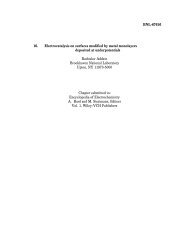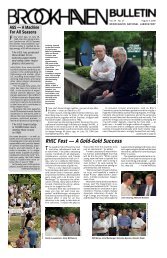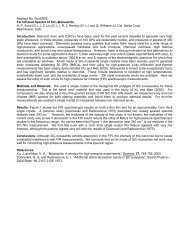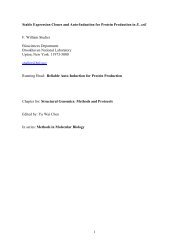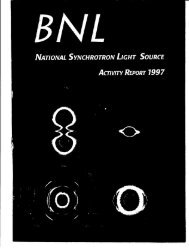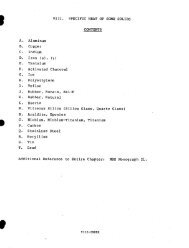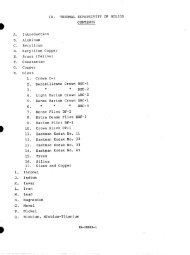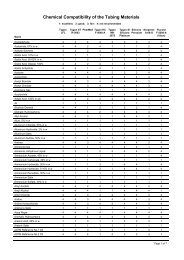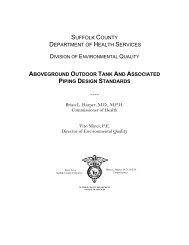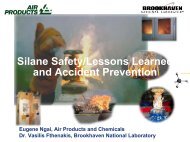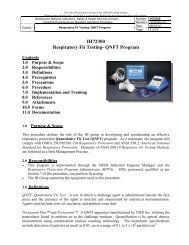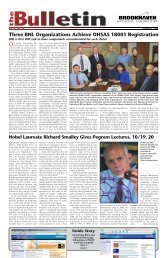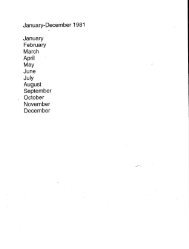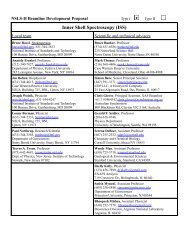Program - Brookhaven National Laboratory
Program - Brookhaven National Laboratory
Program - Brookhaven National Laboratory
You also want an ePaper? Increase the reach of your titles
YUMPU automatically turns print PDFs into web optimized ePapers that Google loves.
We have developed a modular course for non-specialists, including laboratory activities, focused on the<br />
science of materials relevant to four primary areas: (a) the nuclear fuel cycle, (b) safeguards and security, (c)<br />
health and the environment, and (d) materials control and accounting. Our curriculum is ”scenario-based”<br />
wherein real-world examples from each of the four focus areas (modules) drive the course content in terms of<br />
the fundamental scientific principles necessary to understand specific challenges. The hands-on laboratory<br />
component provides instruction in the basics of the instrumentation needed for these real-world scenarios,<br />
as well as an opportunity for guided inquiry, critical analysis, and problem solving in relevant situations.<br />
Our flexible course outline allows for multiple target audiences, including current GW students, incoming<br />
freshmen, and DC-based working professionals. The latter includes non-technical individuals within the<br />
nuclear security and safeguards arena, such as federal/state regulatory officials, national security policy<br />
officials, industry representatives, and Congressional staff. In addition, we have instituted a rigorous plan<br />
for assessment, not only of student learning, but also of the sustainability of the course itself. We will<br />
present the outline of our course, as well as the details of the laboratory activities performed by the<br />
students. The results of our initial delivery of the course in the Fall 2012 semester will be discussed,<br />
including feedback from students and impressions from the instructors. This work was supported by NRC<br />
grant # NRC-HQ-11-G-38-0081.<br />
Corresponding author: Gerald Feldman<br />
RF 3 11:40 AM<br />
What Students Think About Nuclear Radiation - Before and After Fukushima<br />
Susanne Neumann<br />
University of Vienna, Austrian Educational Competence Centre Physics<br />
Preparing successful science lessons is very demanding. One important aspect a teacher has to consider is<br />
the students’ previous knowledge about the specific topic. This is why research about students’ preconceptions<br />
has been, and continues to be, a major field in science education research. Following a constructivistic<br />
approach [1], helping students learn is only possible if teachers know about students’ ideas beforehand.<br />
Studies about students’ conceptions for the major topics in physics education (e.g. mechanics, electrodynamics,<br />
optics, thermodynamics), are numerous and well-documented. The topic radiation, however, has<br />
seen very little empirical research about students’ ideas and misconceptions. Some research was conducted<br />
after the events of Chernobyl (e.g. [2], [3]) and provided interesting insight into some of the students’<br />
preconceptions about radiation. In order to contribute empirical findings to this field of research, our<br />
workgroup has been investigating the conceptions students have about the topic radiation for several years<br />
(cf. [4]). We used children’s drawings and conducted short follow-up interviews with younger students<br />
(from 9 to 12 years old) and more detailed interviews with 15-year-old students. In my talk, I would like<br />
to present our findings from the analysis of two sessions with 43 interviews each which we administered<br />
before and after Fukushima, respectively. Besides asking students about their general associations and<br />
emotions regarding the term radiation, we examined the students’ risk perceptions of different types of<br />
radiation. Also, in open-ended questions we were able to detect students’ conceptions about nuclear as<br />
well as other types of radiation that could be a hindrance to students’ learning. Our results show that<br />
the students’ associations with the term radiation are predominantly related to nuclear radiation. Their<br />
emotions concerning the word radiation are, to a high degree, negative and the idea that radiation, in<br />
general, is something harmful and bad is widely spread among students. Also, it seems to be very difficult<br />
for many students to combine the factual knowledge they learned in school (e.g. the three types of nuclear<br />
radiation and their properties) to the details they read in news reports about Fukushima. Since most students<br />
were not familiar with the idea of naturally occurring nuclear radiation, it does not seem surprising<br />
259



